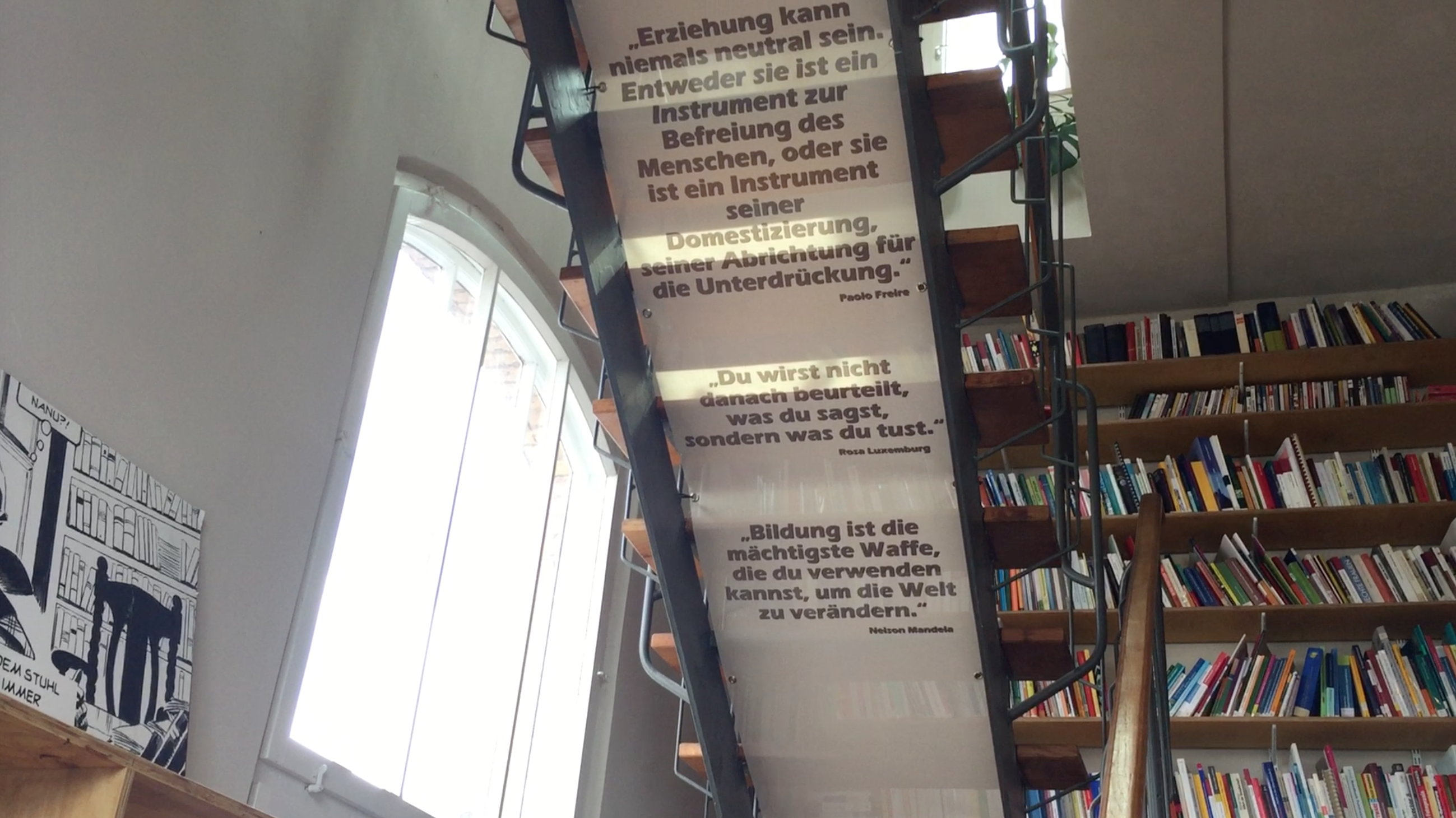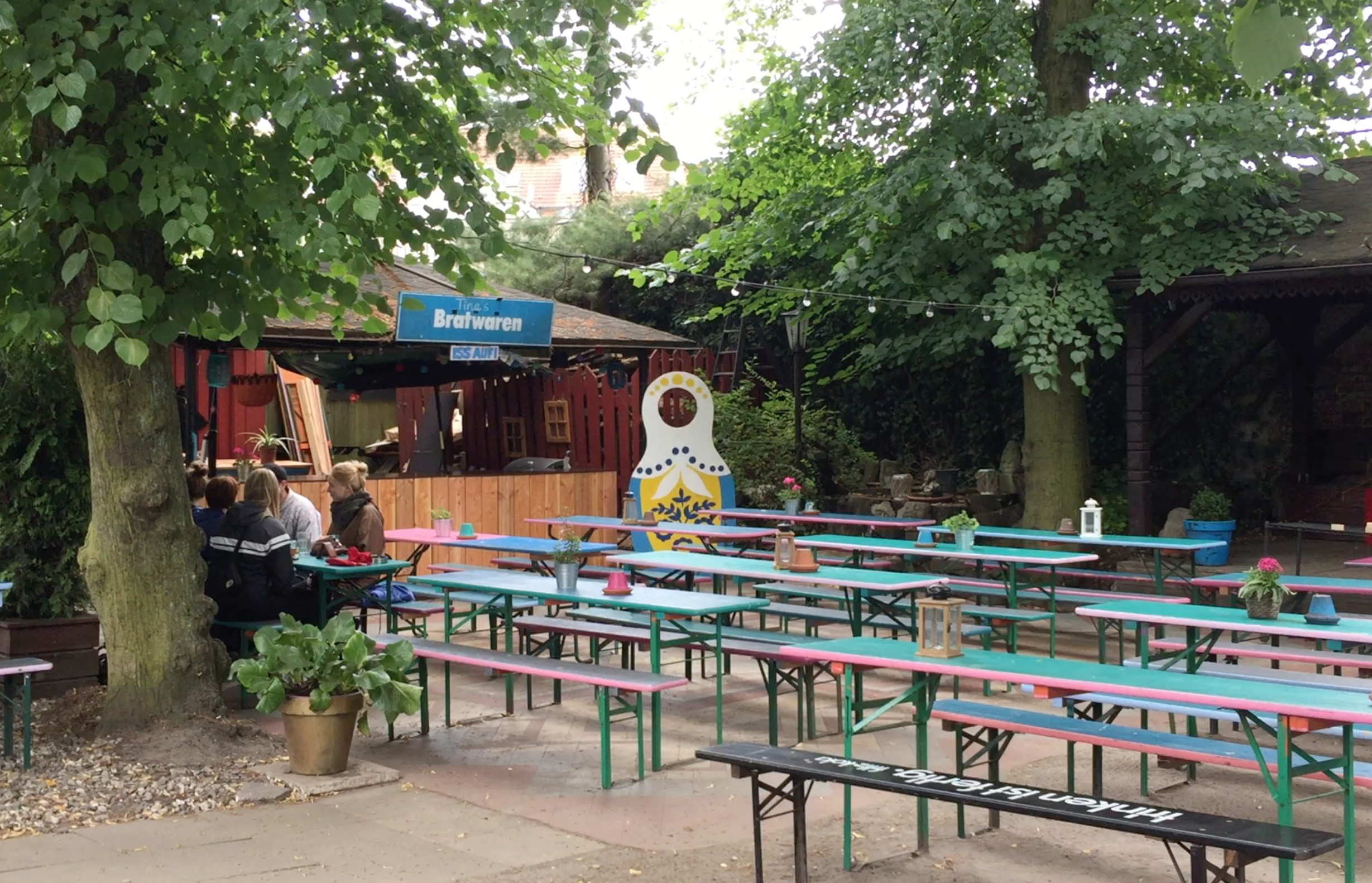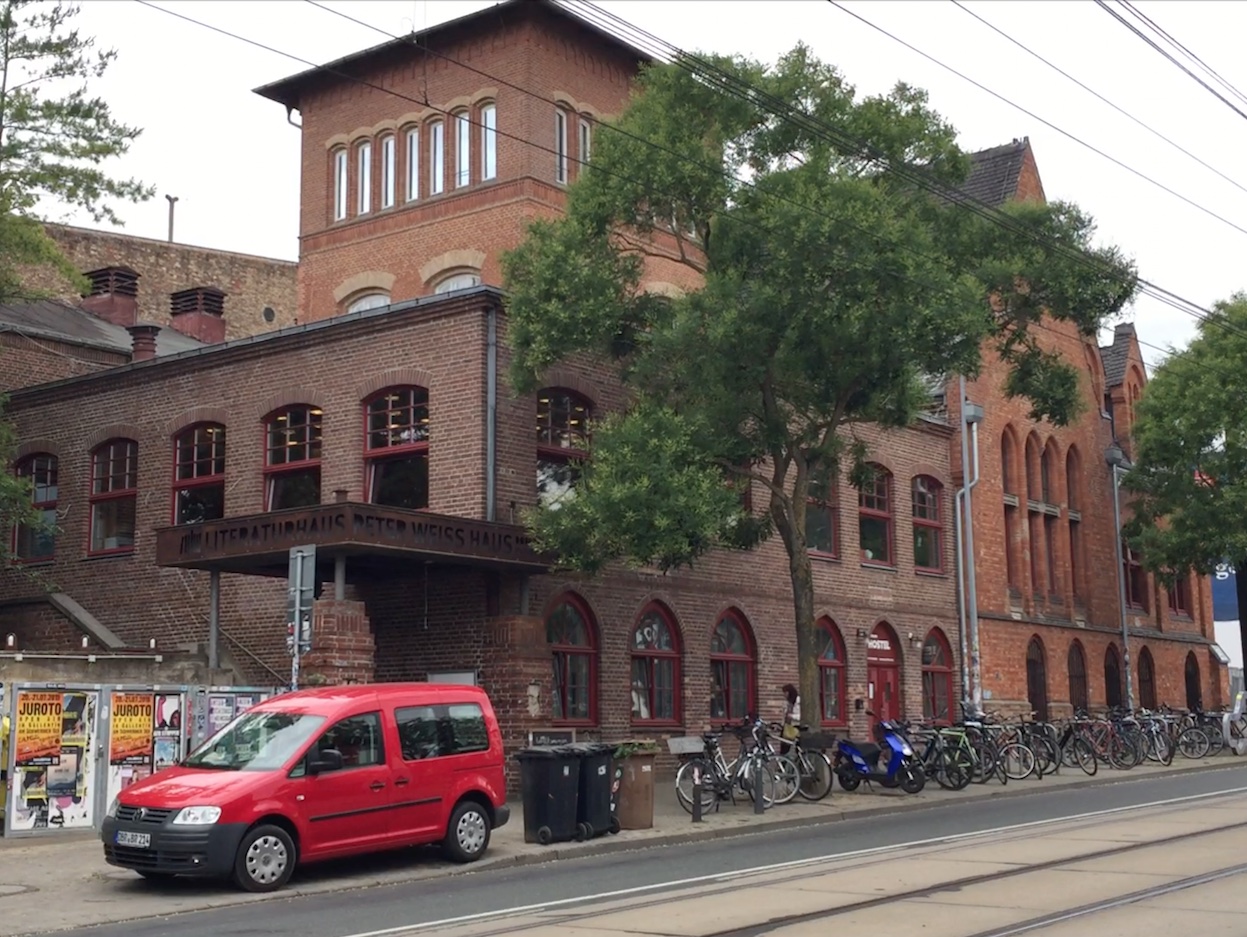The Peter Weiss Haus is as a free educational and cultural centre located in an historical building in downtown Rostock. Through the creation of an original and spontaneous governance structure, supported and bounded by different entities in the city, the Peter Weiss Haus Association has launched a community finance scheme to buy its building and renovate it with the support of volunteers. Their goal is to run not only a literature house that would welcome a mixed audience for readings and theatre performances, while also preserving its monumental value, but also a venue that has very different educational and cultural offers. Several associations that rent and use the house all together fulfil the goals throughout their specific programs and even try to affect current political discussions.
Interview with Marit Baarck (Peter-Weiss-Haus e.V.) und Ulrika Rinke (Literaturhaus Rostock)
Which were the first steps in establishing the Peter Weiss Haus?
We are an association of people from different organisations who have dreamt of opening a literature house. We didn’t have the money and at the time there wasn’t any municipal space available we could use. We asked for counselling to one of the ethical banks present in Germany specialised in sustainable and community-driven projects. They had accompanied us for seven years as we tried to access various smaller venues before finally succeeding with the Peter Weiss Haus.
In 2009 we funded an association that would enable us to buy this venue. This building used to be owned by the next-door brewery, who was happy to sell and was pleased with our renovation concept. This was a very run-down building that had never been renovated over the past twenty years. Many associations were using this space for their offices, but they were unable to invest in it. For this reason, we established one lead association that would act as the venue owner and manage the entire renovation and that would avoid any responsibility to the other associations working in this venue.
Only the base level was usable when we accessed the building in February 2009, and the wild vegetation and garbage completely hid an internal garden. We had to get the bar and the hostel running as quickly as possible since we needed a source of income and we had a call to arms and people helped us clean the space on weekends. With the community help we could open the bar on May 1st, and all the other projects came later on. As we were renovating new parts of the building, we were also moving from a room to another but we finally finished almost the entire renovation.

We have reconstructed the interior and the roof and we are almost done. We have many volunteer helpers and especially youngsters who have recently finished their studies and they are doing their apprenticeships in crafts. In Germany, it is a long tradition to the apprenticeships by traveling for a few years and many trainers came here and contributed in the reconstructions. Their work was fundamental especially in the roof reconstruction and in some of the offices on the top floors. They worked for free and we only covered their accommodation and food.
How much did you invest in this building?
The building cost us €150,000, a good price for us. To buy it, we had a special contract with a bank (GLS Gemeinschaftsbank eG) who supports similar projects. They registered donors who signed up to give a fixed amount of money regularly as a contribution to our loan. This allowed us to collect more than half the price of the building and we bought it with a smaller loan. We bought it and we renewed it on credit and doing many things in our free time with volunteer help.
How did you handle the renovation? Do you have any particular constraint?
Reconstructing such a monumental building implies conforming to high and specific demands and we knew it would have taken a much longer time than renovating a regular enterprise building. But we are also bound by the contract we signed with our sellers, the brewery, and by the bank and the associations we work with. With the brewery contract, we agreed to use less than 50% of our space for commercial purposes, to not use it for residential purpose – except a hostel – and to the external surfaces and the windows within a fixed timeline. This gives us an important self-control tool that allowed us to build these organisations step by step and to maintain independence.

One big constraint we have had is that we cannot simply adapt it to our needs as this is a monumental site protected as heritage. The preservation of the historical aspect of the building was problematic when we were looking for other options that would make the Peter Weiss Haus more accessible for disabled people: our stairs high and difficult for people with different abilities, but we cannot simply build a ramp as this would affect the integrity of this monumental site. Our solution was an external elevator, which however has very high costs we are unable to cover and we haven’t been able to finance this project yet. For the moment, we have had a crowdfunding campaign to build a small elevator that would reach the toilets through the hostel but we didn’t collect enough money yet.
Many things have been improved but not everything is ready and for many of our visitors, this place is not comfortable enough or sometime it appears to be too alternative. Usually, most of the literature houses have an ageing audience for whom is harder to adapt to colder environments – for long time we didn’t have central heating and still now heating in the toilets is absent – but we are able to mix the audiences and also attract young people.
What was the involvement of the associations working in this space in the reconstruction?
The Peter Weiss Haus Association is the leader of the entire project. Over 50% of our work involves registered associations while the economic side involves less than 50% of our work.
The Literaturhäuser and Soziale Bildung cooperatives took part in the decision-making during monthly meetings, but we had to take many decisions as Peter Weiss alone. At first, we had to take quick decisions, so we tried to keep the group flexible enough so we could work well. But now we are trying to open the organisation more and include more people and more associations.
In general, we are organised in groups and teams with specific tasks. We try to moderate problems and supervise the cultural workers in the house so that we can improve internal cooperation. We don’t decide on the cultural programming – such as the band or the authors we invite – but these type of decisions are independent. We also received many critiques from the right-wing since they accuse us of being too radical, while on the contrary the left-wing considers us not left wing enough. We developed our profile over a decade with the inputs of people working in our associations’ network and we prefer to focus on inside feedback to improve this organisation.
We can’t rent more than 50% of our spaces and this helps us to avoid over commercialising as we are forced to keep our economic work at a fixed minimum. We have a hostel, a cafe and the other spaces are all assigned to different associations as Literaturhäuser and Soziale Bildung. The Soziale Bildung was the first association that brought together other associations. We had an office at Frieda before they renewed it, and then we moved here. The economic cooperative rents the hostel and the cafe and they are independent. If we want to use the room they manage we need to pay an extra fee as our monthly rent only covers two smaller rooms.
Are Literature houses top-down institutions?
Literature houses are all very different: most of the associations are managed by the private donors, some of them also received bigger donations from the city like the literature house in Hamburg – which received the venue as a donation and they don’t have to pay rent. Younger people are always hard to attract and the specific characteristic of the venue – a literature palace – can prevent younger people from coming. People are often made to feel that they don’t belong here or that they have to dress up to come here. We are happy to say that here people come because they sincerely want to participate in the reading and it happened that authors would compliment the audience attention.
What do you think is missing in the Peter Weiss Haus?
We have limited resources but we would like to include more people, by either making the place comfortable for an older audience and accessible for people with different abilities. We would like for audiences to mix so that this can become a meeting place. For example, we would like to add bilingual readings in order to invite migrant audiences but we also want to promote German literature. Our next integration step is to get migrants to participate culturally and we had German-Arabic readings in the past and we would like to have them more often but we would also need a bigger staff to promote such activities. Lastly, it would be great to connect with other similar projects in Germany.
Would you see possible to channel any of your activities in the peripheral area of the city? What would be the conditions for that to happen?
The cultural offers in the inner part of the city are stepping on each other toes while this doesn’t happen in the outer part of the city. In Peter Weiss Haus, our activities target a specific audience and to come up with an offer that could work elsewhere we would need to know who lives there and what they would like to do because we can’t just patronise the local audience. A good start would be reaching out to the community centres present in our city and asking for their counselling in order to define a collaboration.
We would like to diversify our programming. We have a program for young poets who want to become authors, it is a very high-class program, but we would like to add a program for people who don’t aim to become publishing author but who could still develop their writing skills. We have many ideas but it has been hard to support them financially and to connect the cultural work with a social worker.
 The Federal Government gives us support and there are dedicated networks for educational associations. Soziale Bildung doesn’t just work in Rostock but it is present in the entire region, Mecklenburg-Vorpommern, and it has many different financial supports and access a variety of funds to support its activities. They have more possibility of collaboration and connection.
The Federal Government gives us support and there are dedicated networks for educational associations. Soziale Bildung doesn’t just work in Rostock but it is present in the entire region, Mecklenburg-Vorpommern, and it has many different financial supports and access a variety of funds to support its activities. They have more possibility of collaboration and connection.
We try to create a weekly program for kids that also allows us to connect with their parents and we have a street work project where contemporary problems (including integration, migration) addresses more directly. We have limited resources, so I wish the associated people realise what is missing and that they can try to develop ideas further.
Can you imagine city level channelling resources that would make your project go beyond its volunteer nature?
Now there is an innovation fund for new initiatives and maybe we could access it but nobody in our group has the capacity to do something beyond what they are already doing, and this is why we don’t even dare developing new ideas. I also don’t think our house needs to be the centre all of the reading and writing-related activities.
We still have to define next years with our group members. At the moment, Peter Weiss Haus has 15 members, four external people working with us as facility managers and in administration.
We have one employee who can work 20 hours a week and we don’t have any possibility of increasing that time and adding more tasks. For us, it is also difficult to connect the bridge between cultural work and social work which don’t have to be necessary separated but they often are. In the last 10 years, our team changed a lot. The senior members of the team have become parents and have less capacity to work in the association. Now that we have structured our organisation and define our profile, we need to make a call and invite new people to join. We would like to include more the younger generation in order to consider a fresh idea and approaches oriented towards the future.
Check out the events at Peter Weiss Haus.


